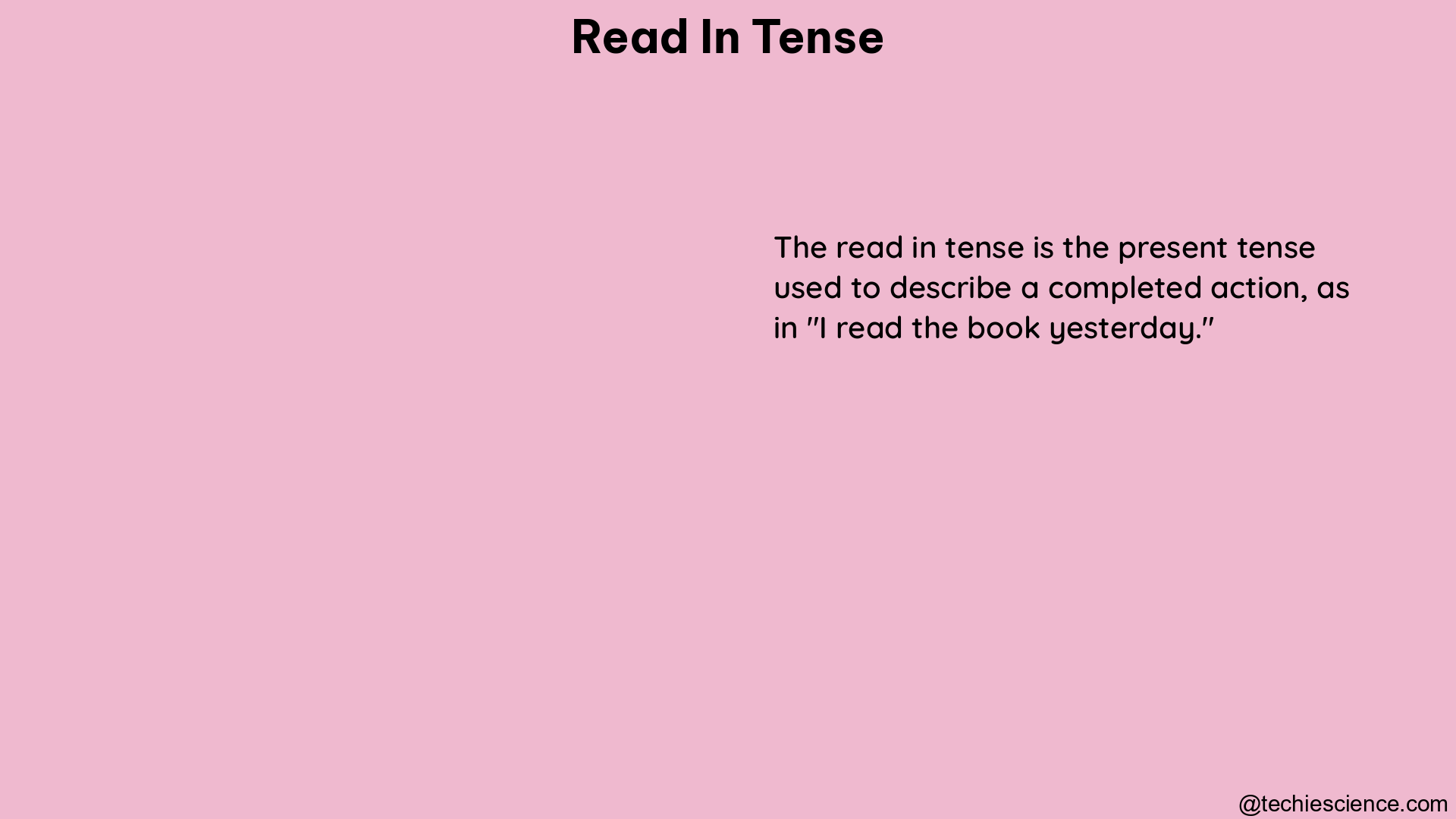The verb “read” in English is a highly irregular verb, and its conjugation can be quite challenging for non-native speakers. This comprehensive guide will provide you with a detailed understanding of the various tenses and forms of the verb “read” to help you master its usage.
Present Tense
Simple Present
- Affirmative: I read, you read, he/she/it reads, we read, you read, they read
- Negative: I do not read, you do not read, he/she/it does not read, we do not read, you do not read, they do not read
- Interrogative: Do I read? Do you read? Does he/she/it read? Do we read? Do you read? Do they read?
Present Continuous
- Affirmative: I am reading, you are reading, he/she/it is reading, we are reading, you are reading, they are reading
- Negative: I am not reading, you are not reading, he/she/it is not reading, we are not reading, you are not reading, they are not reading
- Interrogative: Am I reading? Are you reading? Is he/she/it reading? Are we reading? Are you reading? Are they reading?
Past Tense

Simple Past
- Affirmative: I read, you read, he/she/it read, we read, you read, they read
- Negative: I did not read, you did not read, he/she/it did not read, we did not read, you did not read, they did not read
- Interrogative: Did I read? Did you read? Did he/she/it read? Did we read? Did you read? Did they read?
Past Continuous
- Affirmative: I was reading, you were reading, he/she/it was reading, we were reading, you were reading, they were reading
- Negative: I was not reading, you were not reading, he/she/it was not reading, we were not reading, you were not reading, they were not reading
- Interrogative: Was I reading? Were you reading? Was he/she/it reading? Were we reading? Were you reading? Were they reading?
Present Perfect Tense
Present Perfect Simple
- Affirmative: I have read, you have read, he/she/it has read, we have read, you have read, they have read
- Negative: I have not read, you have not read, he/she/it has not read, we have not read, you have not read, they have not read
- Interrogative: Have I read? Have you read? Has he/she/it read? Have we read? Have you read? Have they read?
Present Perfect Continuous
- Affirmative: I have been reading, you have been reading, he/she/it has been reading, we have been reading, you have been reading, they have been reading
- Negative: I have not been reading, you have not been reading, he/she/it has not been reading, we have not been reading, you have not been reading, they have not been reading
- Interrogative: Have I been reading? Have you been reading? Has he/she/it been reading? Have we been reading? Have you been reading? Have they been reading?
Past Perfect Tense
Past Perfect Simple
- Affirmative: I had read, you had read, he/she/it had read, we had read, you had read, they had read
- Negative: I had not read, you had not read, he/she/it had not read, we had not read, you had not read, they had not read
- Interrogative: Had I read? Had you read? Had he/she/it read? Had we read? Had you read? Had they read?
Past Perfect Continuous
- Affirmative: I had been reading, you had been reading, he/she/it had been reading, we had been reading, you had been reading, they had been reading
- Negative: I had not been reading, you had not been reading, he/she/it had not been reading, we had not been reading, you had not been reading, they had not been reading
- Interrogative: Had I been reading? Had you been reading? Had he/she/it been reading? Had we been reading? Had you been reading? Had they been reading?
Future Tense
Future Simple
- Affirmative: I will read, you will read, he/she/it will read, we will read, you will read, they will read
- Negative: I will not read, you will not read, he/she/it will not read, we will not read, you will not read, they will not read
- Interrogative: Will I read? Will you read? Will he/she/it read? Will we read? Will you read? Will they read?
Future Continuous
- Affirmative: I will be reading, you will be reading, he/she/it will be reading, we will be reading, you will be reading, they will be reading
- Negative: I will not be reading, you will not be reading, he/she/it will not be reading, we will not be reading, you will not be reading, they will not be reading
- Interrogative: Will I be reading? Will you be reading? Will he/she/it be reading? Will we be reading? Will you be reading? Will they be reading?
Future Perfect Tense
Future Perfect Simple
- Affirmative: I will have read, you will have read, he/she/it will have read, we will have read, you will have read, they will have read
- Negative: I will not have read, you will not have read, he/she/it will not have read, we will not have read, you will not have read, they will not have read
- Interrogative: Will I have read? Will you have read? Will he/she/it have read? Will we have read? Will you have read? Will they have read?
Future Perfect Continuous
- Affirmative: I will have been reading, you will have been reading, he/she/it will have been reading, we will have been reading, you will have been reading, they will have been reading
- Negative: I will not have been reading, you will not have been reading, he/she/it will not have been reading, we will not have been reading, you will not have been reading, they will not have been reading
- Interrogative: Will I have been reading? Will you have been reading? Will he/she/it have been reading? Will we have been reading? Will you have been reading? Will they have been reading?
Conditional Tense
Conditional Simple
- Affirmative: I would read, you would read, he/she/it would read, we would read, you would read, they would read
- Negative: I would not read, you would not read, he/she/it would not read, we would not read, you would not read, they would not read
- Interrogative: Would I read? Would you read? Would he/she/it read? Would we read? Would you read? Would they read?
Conditional Continuous
- Affirmative: I would be reading, you would be reading, he/she/it would be reading, we would be reading, you would be reading, they would be reading
- Negative: I would not be reading, you would not be reading, he/she/it would not be reading, we would not be reading, you would not be reading, they would not be reading
- Interrogative: Would I be reading? Would you be reading? Would he/she/it be reading? Would we be reading? Would you be reading? Would they be reading?
Imperative
- Affirmative: Read!
- Negative: Do not read.
Infinitive
- Simple: to read
- Continuous: to be reading
Pronunciation
- Present Tense: /riːd/
- Past Tense: /rɛd/
Adjective Form
- Well-read: used to describe a person who is highly educated or knowledgeable.
Examples
- Present Simple: I read books every day.
- Past Simple: I read a book last night.
- Present Continuous: I am reading a novel right now.
- Past Continuous: I was reading a book when you called.
- Present Perfect: I have read three books this month.
- Past Perfect: I had read the book before watching the movie.
- Future Simple: I will read the report tomorrow.
- Future Continuous: I will be reading the news at 8 am.
- Future Perfect: I will have read all the books by next year.
- Future Perfect Continuous: I will have been reading for three hours by then.
References
- https://conjugator.reverso.net/conjugation-english-verb-read.html
- https://www.gymglish.com/en/conjugation/english/verb/to_read
- https://www.wordreference.com/conj/enverbs.aspx?v=read

Hi…. I am Goutam Datta. I have completed a double M. A. in English and B. Ed. I am a creative writer. Currently, I am a part of the LambdaGeeks.